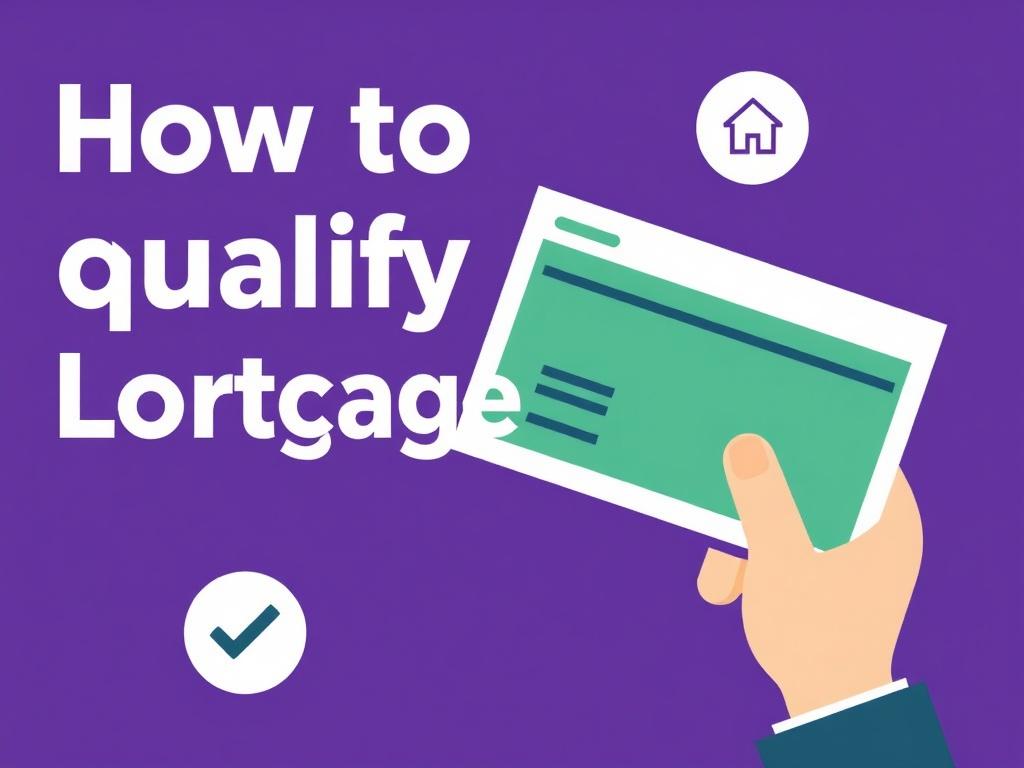SQLITE NOT INSTALLED
Applying for a mortgage loan can feel overwhelming, especially if it’s your first time buying a home. But don’t worry—understanding **how to qualify for a mortgage loan** is easier than it seems once you break it down. Whether you’re dreaming of a cozy starter home or looking to upgrade your living space, knowing the key factors lenders look at will set you on the right path. This article will walk you through everything from credit scores and income requirements to down payments and the different types of mortgages available. By the end, you’ll have a clear roadmap to improve your chances of getting approved for the home loan you need.
Содержание
Understanding the Basics: What Does It Mean to Qualify for a Mortgage Loan?
When lenders evaluate your mortgage application, they’re essentially trying to figure out whether you’re a reliable borrower. They want to make sure you can repay the loan on time and that the risk of default is low. **Qualifying for a mortgage loan** means you meet the lender’s specific criteria, which usually include a combination of creditworthiness, sufficient income, manageable debt levels, and an adequate down payment.
One thing to remember is that **mortgage loan qualification requirements** can vary widely depending on the type of loan, the lender, and current market conditions. Knowing these particulars will help you prepare your application confidently.
Key Factors Lenders Consider When Qualifying You for a Mortgage
There are four main areas lenders focus on when determining whether you qualify for a mortgage loan:
- Credit score and credit history
- Income and employment stability
- Debt-to-income ratio (DTI)
- Down payment and savings
Each of these factors plays a significant role in the lender’s decision-making process. Let’s explore these components in more detail.
Credit Score and Credit History: The Financial Report Card

Your credit score is often the first thing lenders check because it provides a snapshot of how you’ve managed debt in the past. A higher credit score indicates you’re more likely to pay back borrowed money, making you a trusted borrower.
How Your Credit Score Impacts Your Mortgage Eligibility
Mortgage lenders typically prefer a credit score of at least 620 for conventional loans. However, government-backed loans like FHA loans can sometimes accept scores as low as 580. The exact minimum varies by lender and loan type.
A better credit score generally means:
- Lower interest rates on your mortgage
- Better loan terms and lower fees
- Higher chances of loan approval
If your credit score is lower than you’d like, don’t be discouraged. Taking steps to improve your score before applying can make a big difference.
Tips to Improve Your Credit Score Before Applying
| Action | Description |
|---|---|
| Pay Bills on Time | Consistently paying all bills by their due date boosts your credit score substantially. |
| Reduce Credit Card Balances | Lowering your credit utilization ratio (credit used vs. credit available) helps raise your score. |
| Check Credit Reports | Review your credit reports for errors and dispute any inaccuracies to ensure your credit is reported correctly. |
| Avoid New Debt | Refrain from opening new credit accounts or taking on new loans shortly before applying for a mortgage. |
Income and Employment Stability: Proving Your Ability to Repay
Lenders want to see that you have a steady and reliable income to make mortgage payments consistently. Documenting your employment and income thoroughly is one of the most important steps in qualifying for a mortgage loan.
What Income Documentation Is Typically Required?
Most lenders ask for some combination of the following documents:
- Recent pay stubs covering the last 30 days
- W-2 forms from the past two years
- Tax returns, especially for self-employed individuals
- Proof of additional income, including bonuses, commissions, or rental income
Lenders also consider your employment history. Ideally, they want to see at least two years of steady employment in the same field.
How to Strengthen Your Income Profile for Mortgage Approval
If your income is variable or you’re self-employed, it’s essential to gather clear documentation of consistent earnings. Consider:
- Maintaining detailed financial records
- Reducing outstanding debts to improve your overall financial picture
- Having a longer track record of employment or self-employment in your industry
Debt-to-Income Ratio (DTI): Balancing Debt and Income
Your debt-to-income ratio compares your monthly debt payments to your gross monthly income. It measures how much of your income is already spoken for by debts like credit cards, student loans, car loans, and other obligations.
Why Debt-to-Income Ratio Matters to Lenders
DTI is a crucial factor because it helps lenders assess whether you can afford additional monthly debt payments from a mortgage. A lower DTI means you have a better capacity to take on and manage new debt responsibly.
General Guidelines for DTI Ratios
| DTI Ratio | What It Means for Your Mortgage Application |
|---|---|
| Below 36% | Preferred by most lenders; indicates good financial health |
| 36% to 43% | Acceptable for many lenders, but the lower the better |
| Above 43% | Higher risk; may need a co-signer or additional proof of income |
If your DTI is too high, consider paying down debts or increasing your income before applying to boost your chances.
Down Payment and Savings: Putting Your Money Where Your Home Is

The down payment is the upfront cash you contribute toward the home purchase price. It demonstrates your financial commitment and reduces the lender’s risk.
How Much Down Payment Do You Need to Qualify for a Mortgage?
The ideal down payment size depends on your loan type and financial situation. Here are some common benchmarks:
- Conventional loans: Typically require 5% to 20%
- FHA loans: Can require as little as 3.5%
- VA and USDA loans: Often offer 0% down payment options for eligible borrowers
Having a larger down payment can improve your mortgage terms, reduce your monthly payments, and sometimes eliminate the need for private mortgage insurance (PMI).
Proof of Savings and Reserves
Lenders may ask for proof of savings or reserves—extra funds available after your down payment and closing costs. This cushion assures lenders you have the financial stability to handle unexpected expenses.
Types of Mortgage Loans and Their Qualification Criteria
Not all mortgage loans have the same qualification rules. Understanding the different types of loans helps you choose the right fit and know what lenders will expect.
| Loan Type | Typical Credit Score Requirement | Down Payment | Key Features |
|---|---|---|---|
| Conventional | 620 and above | 5% to 20% | Widely available, competitive rates, PMI required if down payment under 20% |
| FHA | 580 or higher (some lenders accept 500-579 with larger down payment) | 3.5% (higher if score under 580) | Government-backed, flexible credit and income guidelines |
| VA | No minimum set, but usually 620+ preferred | 0% | For veterans and active duty, no down payment or PMI |
| USDA | No minimum but typically 640+ | 0% | For rural buyers meeting income limits, zero down payment |
Knowing which loan type you qualify for can save you time and help you prepare the right documents.
Additional Tips to Help You Qualify for a Mortgage Loan
While the factors listed above are the foundation of qualifying for a mortgage loan, here are some extra tips to boost your approval chances:
- Get pre-approved: Pre-approval gives you a budget range and shows sellers you’re serious.
- Minimize large purchases: Avoid major expenses or new debt during the loan process.
- Maintain stable employment: Avoid job changes right before or during your mortgage application.
- Keep your funds documented: Keep records of your savings deposits to satisfy lender requirements.
- Work with a mortgage professional: A loan officer or broker can guide you through lender-specific requirements.
Common Myths About Qualifying for a Mortgage Loan
It’s easy to get tripped up by misconceptions like:
- Myth: You have to have a 20% down payment to get approved. (Reality: Many loans require less or even none.)
- Myth: Only perfect credit scores qualify. (Reality: Many loans accept scores in the mid-600s or FHA loans as low as 580.)
- Myth: Self-employed people can’t get mortgages. (Reality: Self-employed borrowers qualify with proper documentation.)
Separating facts from fiction will give you confidence and help you plan smartly.
The Mortgage Application Process: Step by Step
Understanding the qualification criteria is just the beginning. Here’s what to expect in the typical mortgage application process:
- Pre-qualification: Quick estimate of what you can borrow based on your financial info.
- Pre-approval: More detailed; lender verifies income, credit, and debts.
- Mortgage application: You submit a formal loan application along with documentation.
- Loan processing and underwriting: Lenders verify documents, assess risk, and approve or deny.
- Loan commitment: You receive a loan offer with terms and conditions.
- Closing: Finalize the loan, sign documents, and get the keys to your new home.
Being organized and prepared at each step can speed up your approval and reduce stress.
Final Thoughts on How to Qualify for a Mortgage Loan

Qualifying for a mortgage loan is a vital step toward homeownership, but it doesn’t need to be confusing or intimidating. By understanding the criteria lenders use—credit scores, income stability, debt-to-income ratio, and down payment—you can take practical actions to improve your financial standing. Whether you’re preparing to apply for a conventional loan or exploring government-backed programs like FHA or VA loans, being informed and proactive is key. Remember, everyone’s financial situation is unique, so working closely with a mortgage professional can tailor the process to your needs. Start early, stay organized, and keep your financial goals in sight. Soon enough, you’ll be turning the key to your new home with confidence.
Опубликовано: 23 July 2025 Кредитрон – блог о кредитах, финансах и прочих реверансах
Кредитрон – блог о кредитах, финансах и прочих реверансах

